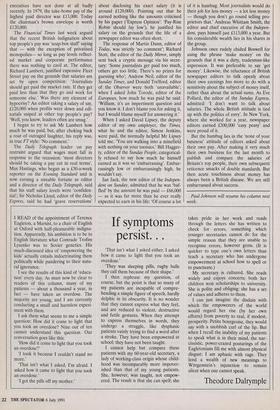If symptoms
persist.. .
I READ of the appointment of Terence Eagleton, a Marxist, to a chair of English at Oxford with half-pleasurable indigna- tion. Apparently, his ambition is to be to English literature what Comrade Trofim Lysenko was to Soviet genetics. His much-discussed idea of 'empowering the kids' actually entails indoctrinating them politically while pandering to their natu- ral ignorance.
I see the results of this kind of 'educa- tion' every day. As must now be clear to readers of this column, many of my patients — about a thousand a year, in fact — have taken an overdose. The majority are young, and I am currently conducting a small and harmless experi- ment with them.
I ask them what seems to me a simple question: How did it come to light that you took an overdose? Nine out of ten cannot understand this question. Our conversation goes like this: `How did it come to light that you took an overdose?'
`I took it because I couldn't stand no more.'
`That isn't what I asked, I'm afraid. I asked how it came to light that you took an overdose.'
`I got the pills off my mother.' `That isn't what I asked either. I asked how it came to light that you took an overdose.'
`They was sleeping pills, rugby balls they call them because of their shape.'
I then rephrase my question, of course, but the point is that so many of my patients are incapable of compre- hending a simple figure of speech, hardly delphic in its obscurity. It is no wonder that they cannot express what they feel, and are reduced to violent, destructive and futile gestures. When they attempt to express themselves in words, they undergo a struggle, like dysphasic patients vainly trying to find a word after a stroke. They have been empowered at school: they have not been taught.
I cannot help but compare these patients with my 60-year-old secretary, a lady of working-class origin whose child- hood was incomparably more impover- ished than that of my young patients. She, however, was taught, not empow- ered. The result is that she can spell; she takes pride in her work and reads through the letters she has written to check for errors, something which younger secretaries cannot do for the simple reason that they are unable to recognise errors, however gross. (It is quicker to type one's own letters than teach a secretary who has undergone empowerment at school how to spell or to punctuate.) My secretary is cultured. She reads widely and enjoys concerts; both her children won scholarships to university. She is polite and obliging: she has a set of values and adheres to them.
I can just imagine the disdain with which the empowerers of the world would regard her rise (by her own efforts) from poverty to real, if modest, prosperity. Petite bourgeoise, they would say with a snobbish curl of the lip. But when I recall the inability of my patients to speak what is in their mind, the nar- cissistic, power-crazed posturings of the Eagletonians fill me with almost physical disgust: I am aphasic with rage. They lend a wealth of new meanings to Wittgenstein's injunction to remain silent when one cannot speak.
Theodore Dalrymple


















































 Previous page
Previous page